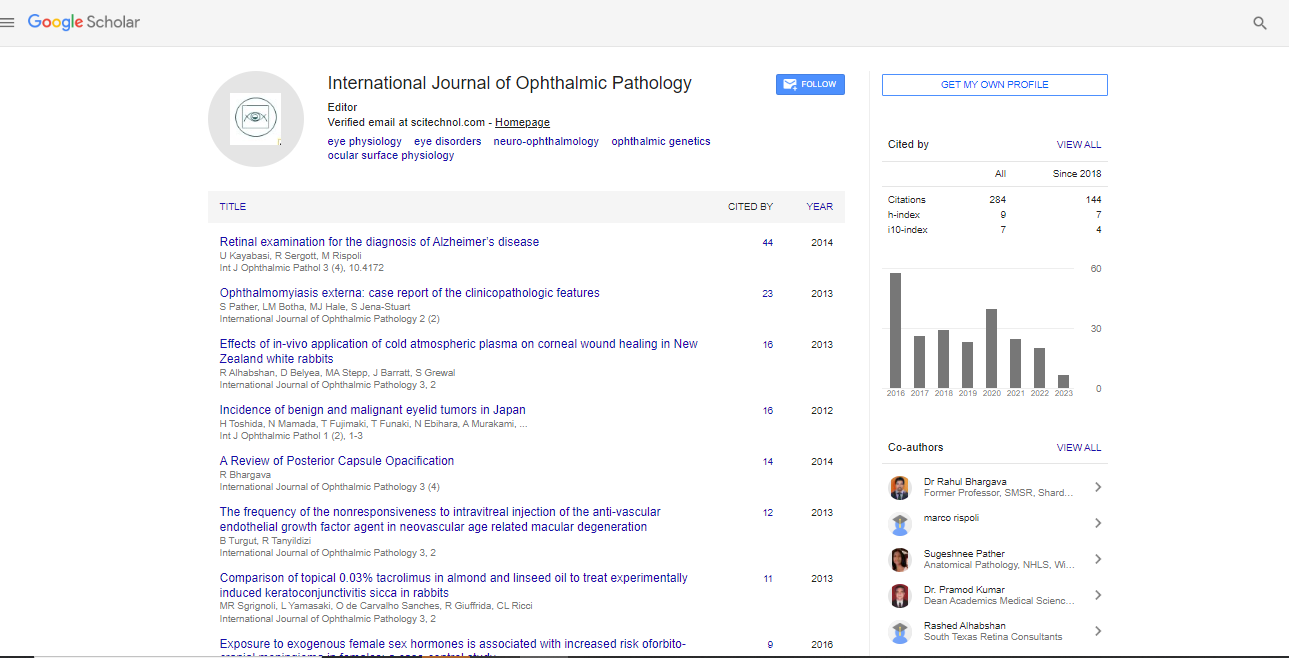Perspective, Int J Ophthalmic Pathol Vol: 12 Issue: 3
Genetic Advancements Changing Ophthalmic Care
Diana Hovakim*
1Department of Ophthalmology, Peking University Shenzhen Hospital, Shenzhen, China
*Corresponding Author: Diana Hovakim,
Department of Ophthalmology, Peking
University Shenzhen Hospital, Shenzhen, China
E-mail: dianahova@szu.edu.cn
Received date: 20 June, 2023, Manuscript No. IOPJ-23-104131;
Editor assigned date: 23 June, 2023, PreQC No. IOPJ-23-104131 (PQ);
Reviewed date: 07 July, 2023, QC No. IOPJ-23-104131;
Revised date: 14 July, 2023, Manuscript No. IOPJ-23-104131 (R);
Published date: 21 July, 2023, DOI: 10.4172/2324-8599.12.3.021
Citation: Hovakim D (2023) Genetic Advancements Changing Ophthalmic Care. Int J Ophthalmic Pathol 12:3.
Description
Genetic analysis has been revolutionized in the field of ophthalmic care. By identifying the genetic causes of various eye diseases and disorders, these advancements have paved the way for more accurate diagnoses, personalized treatments, and improved patient outcomes.
Genetic testing has emerged as a powerful tool for precise diagnosis in ophthalmology. By analyzing an individual's genetic makeup, clinicians can identify specific genetic variants associated with various eye conditions. This enables early detection, risk assessment, and tailored treatment plans based on an individual's genetic profile.
Genetic advancements have facilitated early intervention in ophthalmic care. Identifying genetic markers for conditions like retinitis pigmentosa, macular degeneration, and glaucoma allows for proactive monitoring and intervention before symptoms manifest. Early detection increases the likelihood of successful treatment and preservation of vision.
Genetic information helps in developing personalized treatment strategies for ophthalmic conditions. By understanding an individual's genetic predisposition, clinicians can tailor treatment plans based on genetic profiles, maximizing efficacy and minimizing adverse effects. Personalized medicines are the targeted therapies and better treatment outcomes for this genetics.
Gene therapy has emerged as an innovative approach in ophthalmic care. It involves introducing functional genes into affected cells to correct genetic mutations or restore proper cellular function. This approach shows the treating inherited retinal diseases, such as Leber congenital amaurosis and retinitis pigmentosa, potentially offering long-term vision restoration.
Advancements in gene editing technologies, such as Clustered Regularly Interspaced Short Palindromic Repeats-associated protein 9 (CRISPR-Cas9), hold tremendous potential for treating genetic eye diseases. These techniques allow scientists to precisely modify or correct faulty genes associated with ophthalmic conditions, opening new avenues for therapeutic interventions and potential cures.
Genetic analysis has deepened the understanding of mechanisms underlying various ophthalmic disorders. Studying the genetic basis of diseases provides insights into disease progression, pathophysiology, and potential therapeutic targets. This knowledge drives the development of novel treatments and the repurposing of existing drugs for ophthalmic conditions.
Genetic advancements have also facilitated genetic counseling services for individuals and families affected by inherited eye diseases. Genetic counselors provide information, support, and guidance regarding the genetic risks, inheritance patterns, and potential implications for family members. This empowers individuals to make informed decisions about their eye health and family planning.
Genetic advancements have fostered collaborative analysis efforts in ophthalmology. International consortia, analysis networks, and genetic databases allow analysts to pool resources, share data, and accelerate genetic discoveries. This collaborative approach accelerates the identification of novel genetic variants and promotes the translation of analysis findings into clinical practice.
Genetic information enhances prognostic tools for ophthalmic conditions. Understanding the genetic factors influencing disease progression and severity helps clinicians predict outcomes and tailor management plans accordingly. This facilitates more accurate prognoses, allowing patients and healthcare providers to make informed decisions about treatment options and long-term care.
The integration of genetics into ophthalmic care continues to advance rapidly. As technologies improve and the understanding of genetic basis of eye diseases expands people can anticipate even more significant advancements. Precision medicine, gene therapies, and gene editing techniques are transforming the treatment landscape and offering hope for individuals affected by genetic eye diseases.
Conclusion
Genetic advancements are dramatically changing the landscape of ophthalmic care. From precision diagnostics and personalized treatments to gene therapies and gene editing techniques, genetics is driving progress in understanding, diagnosing, and treating ophthalmic conditions. The integration of genetic data into clinical practice is allowing for more focused and efficient interventions, increasing patient outcomes and revolutionizing the current state of ophthalmic care.
 Spanish
Spanish  Chinese
Chinese  Russian
Russian  German
German  French
French  Japanese
Japanese  Portuguese
Portuguese  Hindi
Hindi 